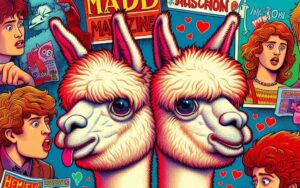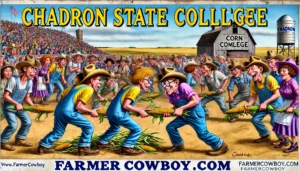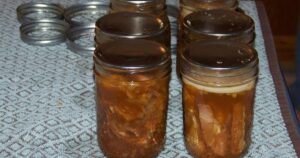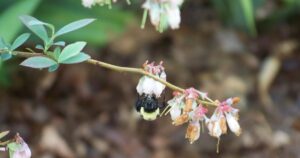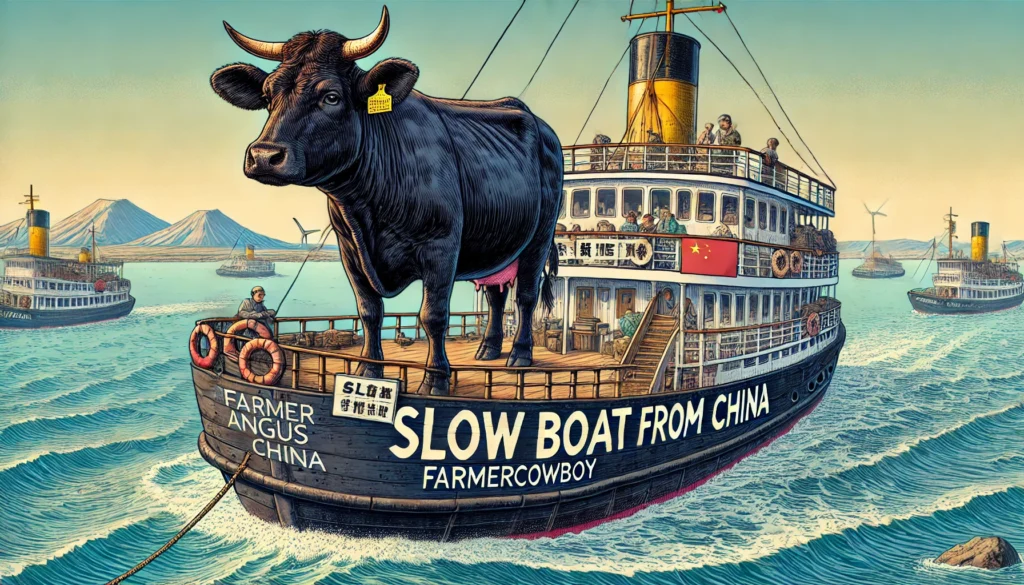
Food Safety Beef China A vivid and detailed satirical illustration of a black Angus cow on a slow boat from China cruise ship. The cow is standing on the deck looking sli3.webp.webp
Is Our Food Supply Really Safe? Good Ranchers Sound the Alarm on Imported Meat and mRNA Vaccines!
Meat of the Matter: When your steak has traveled more than you have, it’s time to worry.
Written in Beef City, Texas — In the southwest of America, a new kind of skepticism is brewing—not about politics, but about something far more personal: the food on our plates. As more and more consumers begin to question where their meat is coming from, the founders of Good Ranchers, Ben and Corley Spell, are leading the charge in calling out the murky practices of the meat industry.
The Great Beef Debate: Imported vs. American-Born
For years, Americans have trusted those USDA labels—Prime, Choice, Select—to guide their decisions at the grocery store. But what happens when those labels no longer guarantee that the meat in your cart is truly American? According to Ben Spell, the rules have changed, and not for the better.
“It’s mostly coming from Mexico,” Ben explains, “but if it spends 90 days in a U.S. feedlot, it can still get that USDA grade.” That’s right—your USDA Prime steak might have been born south of the border before making its way to your dinner plate. It’s enough to make any carnivore’s head spin.
Bovine Over Borders: Who knew that the cow in your burger might have had a better vacation than you?
Eye-Witness Testimonies: The Consumers Speak
We spoke with several concerned consumers who are fed up with the confusion. “I used to trust those USDA labels,” says Nancy “Steak Lover” McGee. “Now I’m not so sure. How do I know if my steak was born in Texas or Tijuana?”
Another shopper, Tom “BBQ Master” Johnson, shared his frustrations: “I’m all about buying American, but when the labels don’t tell the whole story, it’s hard to make informed choices. I don’t want to be grilling foreign beef at my Fourth of July party!”
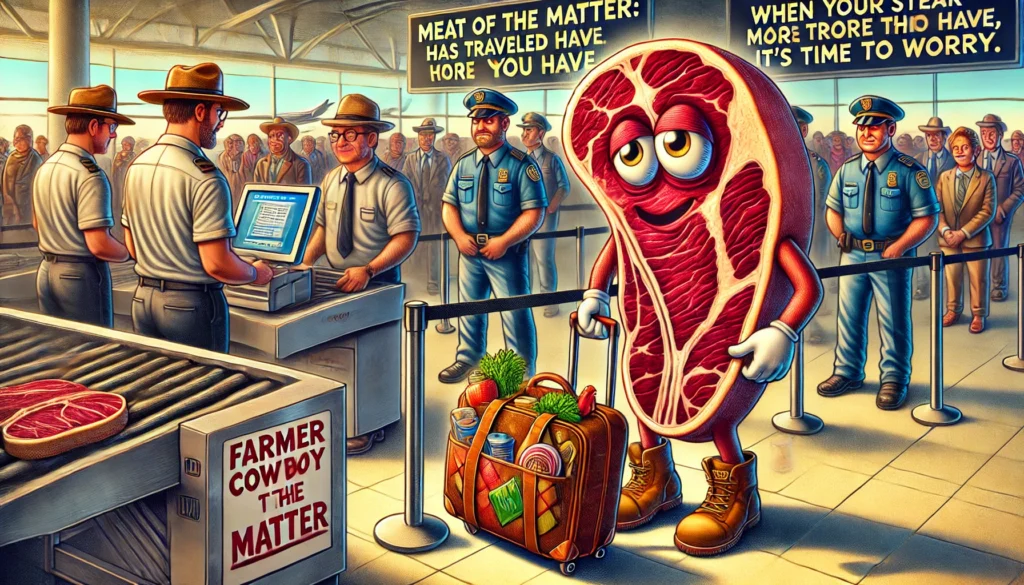
Public Opinion: The Growing Skepticism
Public sentiment is shifting, with more Americans questioning the integrity of their food supply. A recent survey found that 68% of consumers believe they should be informed about the origins of their meat, and 75% are concerned about imported meat being labeled as USDA Prime or Choice.
But it’s not just about where the meat comes from—it’s about what’s in it. The introduction of mRNA vaccines in the meat supply has raised new concerns, with many consumers wondering what’s really in their pork chops.
USDA Confusion: Is it really “prime” if it’s spent more time in customs than in a pasture?
The mRNA Mystery: What’s Really in Your Meat?
In 2022, the USDA approved the use of an RNA-based vaccine developed by Merck Animal Health. While the vaccine is intended to prevent disease in livestock, it’s left many consumers uneasy. The idea of eating pork that’s been treated with an mRNA vaccine is enough to make even the most devoted carnivore pause.
Ben Spell is one of the few in the industry willing to speak out. “We don’t use mRNA vaccines in our meat,” he says. “But we can’t speak for everyone else.”

Beef with the System: Ranchers Struggle to Compete
The issues facing America’s food supply go beyond imported meat and mRNA vaccines. As Ben points out, America’s independent ranchers are struggling to keep up with the big conglomerates. “Agriculture is the backbone of our country, and farms and ranches are going out of business at an alarming rate,” he explains.
The price of meat continues to rise, but the money isn’t going to the ranchers. Instead, it’s lining the pockets of large corporations that dominate the industry. For small, independent ranchers, it’s becoming harder and harder to compete.
Import/Export Shakedown: When your brisket needs a passport, you know something’s up.
Anecdotal Evidence: Stories from the Ranch
Take Farmer Joe, a rancher from Beef City, USA. Joe’s been raising cattle for over 30 years, but he’s never seen anything like this. “The price of feed keeps going up, but the price I get for my cattle hasn’t changed in decades,” he says. “I’m not sure how much longer we can hold on.”
Joe’s story is echoed by ranchers across the country. As the cost of doing business continues to rise, more and more ranchers are being forced out of the industry. And with them goes a piece of America’s agricultural heritage.

The Future of America’s Meat Supply: What’s Next?
So what does the future hold for America’s meat supply? If trends continue, we could see more imported meat on our plates, more confusion over labels, and more mRNA-treated pork products in the grocery store.
But there is hope. As consumers become more informed, they’re demanding transparency from the meat industry. Independent ranchers like Ben and Corley Spell are leading the charge, offering high-quality, American-born meat that consumers can trust.
The Real Cost of Cheap Meat: A Call to Action
It’s time for Americans to take a stand. Our food supply is too important to leave in the hands of big corporations and shady labeling practices. By supporting independent ranchers and demanding transparency, we can ensure that the meat on our plates is safe, healthy, and truly American.
As Farmer Joe put it, “We need to stop thinking about short-term gains and start focusing on the long-term health of our food supply. Because if we don’t, we’re all going to end up with a lot of cheap meat and nowhere to get the good stuff.”

Step-by-Step Guides for Farmers & Cowboy Readers
- Decode USDA Labels: All labels are not created equal. Dive deep into the differences between USDA Prime, Choice, and Select, and learn what they truly represent—especially with the changing regulations.
- Pro Tips for Meat Shopping: Whenever possible, prioritize purchasing meat from local sources. Not only does this support your community, but it also gives you better control over the quality and origin of your food.
- Insider Knowledge on Imported Meat: Be cautious of imported meat that carries USDA labels. Just because it has the stamp doesn’t mean it was born, raised, and harvested in the U.S. Dig deeper into where your meat really comes from.
- Best Practices in Supporting Ranchers: Show your support for independent ranchers who emphasize quality over mass production. By choosing their products, you’re investing in the sustainability of American agriculture.
- Stay Informed on mRNA Vaccines: Get educated on the use of mRNA vaccines in the meat industry. Understanding how these vaccines are used and what they mean for your food supply is key to making informed choices.

Disclaimer:
This article is a satirical piece and should not be taken as professional advice. While the concerns about the food supply are real, we recommend doing thorough research and supporting local farmers and ranchers whenever possible. No cows were harmed in the making of this story, though a few were questioned about their travel history.
Why Americans are Growing Skeptical of What’s Really on Their Plates.
15 Educational Observations on “The Food Supply Crisis”
- Meat of the Matter: When your steak has traveled more than you have, it’s time to worry.
- Bovine Over Borders: Who knew that the cow in your burger might have had a better vacation than you?
- USDA Confusion: Is it really “prime” if it’s spent more time in customs than in a pasture?
- Price Moo-nipulation: The cost of beef is up, but ranchers are stuck in a time warp where their paychecks are from the 80s.
- mRNA Mystery Meat: When your pork has more science than seasoning, you start to wonder.
- Imported Cow-spiracy: They say you are what you eat, but does that make us part Mexican beef now?
- Farm-to-Feedlot: From born in the USA to feedlotted in America, the labels just keep getting murkier.
- Beefing with Labels: USDA Prime, USDA Choice—who knew meat had more grades than a high school report card?
- Cattle and Confusion: Trying to figure out where your meat comes from feels like solving a murder mystery.
- Ranchers vs. Robots: The price of cattle might stay the same, but who’s really behind the scenes—cows or corporations?
- mRNA Meat Madness: Remember when we only worried about mad cow disease? Now it’s mad lab-grown disease.
- Import/Export Shakedown: When your brisket needs a passport, you know something’s up.
- Foreign Beef Frenzy: It’s getting harder to tell if your steak was born here or just visiting.
- Pork and Pathogens: What’s scarier—pork treated with mRNA or pork that’s been on more flights than you?
- Beef with the System: When ranchers can’t compete, the real losers are the people who want to know where their food comes from.

Originally Published at FarmerCowboy.com
2024-08-19 10:19:59
Karl Hoffman is a distinguished agriculturalist with over four decades of experience in sustainable farming practices. He holds a Ph.D. in Agronomy from Cornell University and has made significant contributions as a professor at Iowa State University. Hoffman’s groundbreaking research on integrated pest management and soil health has revolutionized modern agriculture. As a respected farm journalist, his column “Field Notes with Karl Hoffman” and his blog “The Modern Farmer” provide insightful, practical advice to a global audience. Hoffman’s work with the USDA and the United Nations FAO has enhanced food security worldwide. His awards include the USDA’s Distinguished Service Award and the World Food Prize, reflecting his profound impact on agriculture and sustainability.
